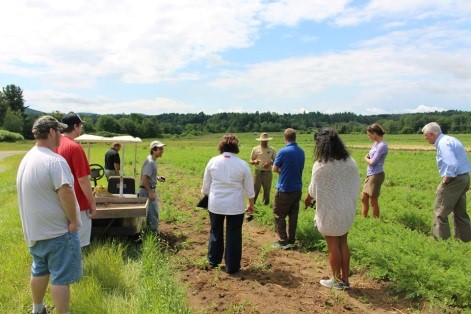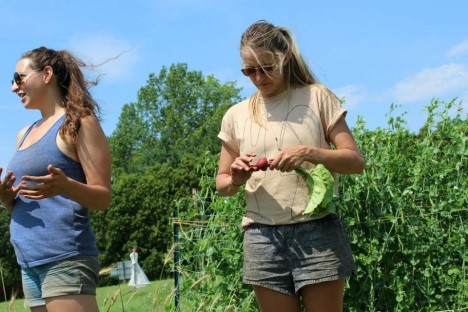
Chefs and managers from Norwich University and University of Vermont visit Chappelle’s Potatoes in Williamstown, VT.
by Annie Rowell
Earlier this summer, I came across Corby Kummer’s Vanity Fair article, “Is It Time to Table Farm-to-Table?” Kummer’s article captures part of an unfortunate trend that questions the integrity of the local food movement and goes so far as to say that no one cares about where their food is from anymore: “That’s where the future of farm-to-table should be: food that speaks for itself without having to tell you where it comes from.” I read the article, started writing about it, but couldn’t get beyond saying that this was just wrong.
I didn’t realize it then, but I was reading the article at the right time, as I was heading into a week of learning from people who would have some serious thoughts on this topic. On Wednesday at a local food campaign meeting through the Vermont Farm to Plate network, Megan Sheridan of the Vermont Fresh Network summed up “that Vanity Fair article” as a case of the counter-local food movement missing the mark.
The next day, at the New England Food Summit in Boston, I was catching up with Scott Sawyer of the Vermont Sustainable Jobs Fund. I couldn’t help but ask his opinion on the article, and (in the way I was secretly hoping he would) he brought it full circle. Kummer offers a shallow review of what could be best categorized as a first-world problem: tiring of too much of a good thing. In Vermont, it has been just over five years since the launch of Vermont Farm to Plate, our state’s strategic plan. We’ve made it through the first sprint, but now is the critical time to test our endurance and commitment to be not just a trend, but rather a fundamental shift.
Scott encouraged me to move my focus away from Kummer to the larger indicators of the real impact of our work in building a resilient food system. He referenced evidence of large companies adapting to customers who demand fresh, sustainable, and local products.
“Like Sodexo?” I offered. The purpose of our work in Sodexo’s Vermont First Initiative is to keep integrity in the words we use to describe local and sustainable purchasing, building trust among our partners in the food system. We are part of the ever-growing indicator that the local food movement is not just a trend.












